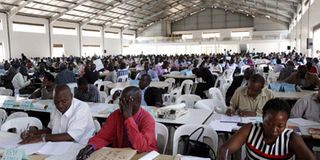Schools asked to relax S5 sciences entry points

Head teachers during the S.5 selection exercise in Lugogo, Kampala yesterday. PHOTO BY Rachel Mabala.
What you need to know:
Encouragement. Ministry says affirmative action should be taken to increase the enrolment for science subjects
KAMPALA.
The Minister of state for Higher Education, Prof Sandy Stevens Tickodri-Tagboa, yesterday directed schools to relax entry cut-off points for students wishing to join their institutions for science courses.
According to Prof Tickodri, science subjects need affirmative action in order to have more students enrolling for the courses to increase stock to train scientists needed for the job market.
“You have to adjust this year’s intake for science combinations in order to increase the potential of our scientists. The credit four is any event that occurred on the day this student sat the examinations. I have known students at university who came in with four principle As and came to engineering but by the time they are in second year, those who came with Cs are the ones performing well,” Prof Tickodri said yesterday.
He was speaking to more than 1,000 secondary school head teachers who travelled from across the country for Senior Five selections at Uganda Manufacturers Association showground.
“I think we should not condemn these students on the basis of whether they got Distinction 1 or Distinction 2. This is what must relax. This somebody who has got a Credit 4 is teachable in the sciences. We are not compromising quality,” he added.
Most good traditional schools maintained their cutoff points because of the competition.
For instance, at Kings College Budo, Mr Wilson Nsubuga, the deputy head teacher, said their cut-off points had improved from last year’s Aggregate 11 for the boys to Aggregate 10 this year while they will take girls who scored Aggregate 12 from last year’s Uganda Certificate of Education.
He was, however, disappointed that although they admit the cream from the results, there are those who don’t perform to the school’s expectations and that this strains their teachers. Mr Nsubuga blamed it on their former primary schools accusing them of training their students to pass examinations instead of helping them understand concepts.
“We expect the best out of the students we admit. Unfortunately, the results are not as genuine as we thought. At times we get the best in Senior One but after first term, we feel like chasing them. You wonder whether those PLE scores were theirs,” Mr Nsubuga said.
However, the chairman of the Ministry of Education admissions board, Lucien Omagor, urged the head teachers to admit all students deemed to have passed by the Uganda National Examinations Board (Uneb).
According to Uneb statistics, 274,863 students passed the 2015 Uganda Certificate of Education exams in Divisions 1 to 4 representing an overall average pass of 90.3 per cent compared to 284,022 (93.4per cent), who passed in 2014.
Releasing the results last month, Mr Mathew Bukenya, the Uneb executive secretary said there was a serious shortage of science teachers in rural schools which affected the setting up of apparatus and mixing of solutions, which were meant for the practical papers.
He explained that because of the scarcity of the science teachers, many had to move to more than one centre to carry out the preparations. For example, the percentage pass for physics and chemistry subjects remained low with almost 60 per cent of the candidates unable to demonstrate the minimum competency required to be graded.
By Sandra Birungi,
Zuurah Karungi,
Lillian Namagembe
& Patience Ahimbisibwe




